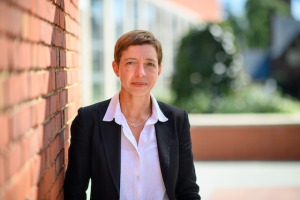
Going to college may be a difficult decision for many prospective students. Rollins alumni reveal why they chose to attend college and how their degree has helped them in the real world.
Is college for me? It is a question everyone asks—whether they are on the brink of high school graduation or in the midst of their adult responsibilities—why do I need an education?
I am sure many students have heard of the phrase “Cs get degrees.” and you begin to wonder why you should even make the effort.
Several students and alumni from Rollins College were asked what an education meant to them. Eddie Huang ’04, a chef, writer, and former English major, considers this question with respect to the world being a melting pot: a multi-level highway where everything connects in a way that compliment and influence one another. This is the way you grow as an individual. College can help you achieve this, Huang ’04 advises the most important skill you can learn is critical thinking: “The ability to create your own values and apply them to situations is the beginning of a good education. There is so much misinformation and noise in the world today that you really have to scream to hear yourself and avoid falling into the matrix with the rest of the lemmings.” Kirby Ferguson, a Los Angeles based filmmaker argues that “our creativity comes from without, not from within. We are not self-made.” In his TED talk from June 2012 entitled “Embrace the Remix,” he presents the notion that, as individuals, this acknowledgment allows us the license to “simply begin,” satiated in the understanding that we cannot do it alone.
Who inspires us to go to college? Some students cited their children and some their parents. James Farrell ’15, a Computer Science major, credits his twin sons for his motivation: “I want them to see that I valued getting an education so they will be more inclined to finish school with a college degree.” Karen Hays ’17, in the Accelerated Masters Program for Business, witnessed in her lifetime an array of adults attending college later in life, including her mother. This inspired her to attend a Rollins informational seminar. “Attending school later in life runs in the family,” she remarks, being a prime example that college is an enthralling experience at any age.
For Katie Rhodes ’16, English major, her upbringing dictated that college was just part of life. Upon attending Rollins, her classmates and their passions inspired her: “The people around me who had to work and fight to attend the higher education I had always just taken for granted made me appreciate going to college, and helped me see it for the privilege that it is.” Joseph Long ’17, an Organizational Behavior Major, thanks his late father for his zeal: “He’s always told me that the value of getting a college degree is the most hopeful feeling in the world, that you can always find a place in this country learning what you love to do through the many that gifts you have.”
Brooke Varney ’16, English Major, gives thanks to her grandfather, a successful engineer and first generation Italian immigrant: “I’m certainly no genius, especially when it comes to math, but if he could achieve all he did after starting out with little to nothing, I’d feel like a fool to not even try and further my education.”
What could dissuade someone against an education? Finances are always an issue. Some students have been fortunate to receive scholarships, financial aid, and assistance from their families to help fund their education. Rhodes ’16 laments that the biggest obstacle for attending college is herself: “I’ve gone through periods where I allow myself to get caught up in different aspects of college life and end up drifting off course and not doing well in school. But I’ve also found that in addition to being my own worst enemy in that respect, I’m also my biggest advocate and have the power of being able to motivate myself to do things more than anyone else.”
As an educator, what can be done to inspire students in the classroom? At Rollins, the opportunity for students to have specialized attention by their professors, due to the smaller class sizes, is extremely helpful and, maybe for some, crucial. Rollins English Professor Maurice O’Sullivan worries that there is a growing sense that college is just a business: “Too many people want college simply to become a training program to prepare people for specific jobs and limited lives.” How do educators fight against that? By being honest with their students and supplying them with material that teaches them lessons they can carry with them in all walks of life. For those eager to learn, what could a college education offer us? “To me, the most important gifts any student can take out of college are curiosity, an appreciation for learning, and a passion for some subject,” remarks Professor O’Sullivan. “A real education makes people far more interesting than they might otherwise have been. Taking courses just to get a degree or certification without investing any effort or emotion simply lets people wallow in their dullness. And who wants to live with dull people?”
Continual curiosity is what Dana Ivey ’63 ’08H, film and Tony nominated stage actress, has taken away from her Rollins education. As a Theatre Arts alumni and Honorary Doctorate of Humanities, she gives invaluable insight to current Rollins students pursuing a creative career and what it takes to be successful: “A creative career is a difficult path. It flies in the face of our culture’s bottom-line value system. Few people who follow a creative path become rich, except in spirit and intelligence. An actor, particularly, even more a dancer, may have a very hard time making ends meet, so there must be overwhelming passion for the art to hold you fast and propel you forward.” Work ethic is what sets you apart from the rest of the pack; it is the deciding factor in who makes it and who does not. Ivey ’63 ’08 cites dedication as the foundation in which we must build for ourselves: “Dedication means perseverance, patience, attention to detail, doing exercises, reading, always learning, appreciating, and believing in what you are doing, without cynicism (a soul-killer) or defeatism. There is no room for slacking, no room for attitude, no room for discourtesy.”
When someone puts their pen to paper and writes what they know or wish to know more about, when a dancer or an actor takes the stage, when a businessperson writes up an important proposal, or when you are tucking your children into bed, you are sowing seeds. Whether you are utilizing critical thinking or creating art, you are not only shedding layers of yourself, allowing others to see you for the person you are, but also developing layers, to allow others to draw inspiration from you. It is our duty as students to not only celebrate the light, but also be a motivation for others. From the moment you walk on campus for the first time, to the moment you are walking on stage on Graduation day, Fiat Lux. Let there be light.







Be First to Comment